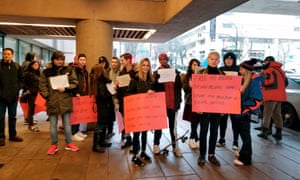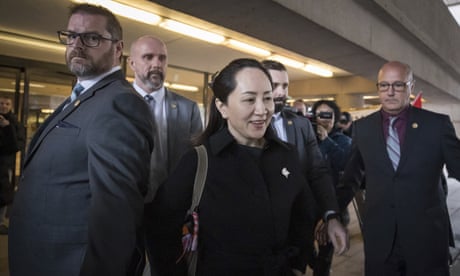More than a dozen people outside Vancouver courtroom with ‘Free Meng’ signs were promised C$100 for two hours’ work on a movie
Leyland Cecco in Toronto and agencies
Wed 22 Jan 2020 The Guardian

Protesters stand outside a Vancouver courtroom
on 20 January 2020. Photograph: Alia Dharssi/AFP
via Getty Images
Protesters calling for the release of a senior Chinese telecommunications executive arrested in Canada have admitted they were paid actors, in the latest twist in a closely watched extradition case that has chilled relations between Ottawa and Beijing.
More than a dozen people joined a demonstration on Monday outside a Vancouver courtroom where the Huawei executive Meng Wanzhou is fighting extradition to the US for alleged fraud related to sanctions against Iran.
The protesters held handwritten signs that read “Free Meng” and “Trump stop bullying us” – but it soon emerged that they were actors who had been promised C$100 ($76) for two hours’ work on a movie.
In a Facebook post, one of the actors, Julia Hackstaff described the fake protest as a “filthy cheap scam” that has resulted in her receiving hate messages online.

Huawei CFO's extradition would let US criminalize behavior in Canada, say lawyers
Hackstaff said she had been offered work as a movie extra, but soon after arriving at the court realized she had been duped into attending a real event.
“I feel cheated, used, abused, angry, deeply saddened and emotions that I don’t even have words to describe,” she wrote. It was unclear who had recruited the actors.
A Huawei spokesman told the AP that the company had no involvement with the protest. China’s embassy in Ottawa did not immediately respond to a message seeking comment.
Another protester, Ken Bonson, gave an identical account to the Toronto Star, saying she “had no idea what I was going into”.
“I’m honestly pretty ashamed and embarrassed,” she said, explaining that she had not known about Meng or her legal saga.
The revelations came as Canadian government lawyers returned to court for the third day, to argue that Meng – Huawei’s chief financial officer – should be extradited because she was guilty of fraud – and not because she violated US sanctions against Iran.
Meng’s legal team has argued that she was caught up in a US effort to use its extradition treaty to get Canada to enforce US banking sanctions against Iran.
The US alleges Meng lied to HSBC about Huawei’s relationship with its Iran-based affiliate Skycom, putting the bank at risk of violating US sanctions against Tehran.
“Lying to a bank in order to get banking services that creates a risk of economic prejudice is fraud. Fraud – not sanctions violations – is at the heart of this case,” Canadian prosecutor Robert Frater told the court on Wednesday.
In order to win extradition, lawyers for Canada’s attorney general – acting on behalf of the US justice department – must demonstrate that the US accusations against Meng would be considered a crime in Canada if they had occurred there.
Meng has maintained her innocence, saying the alleged conduct was not illegal in Canada. Unlike the United States, Canada did not have sanctions against Iran at the time Canadian officials authorized commencing with the extradition, her lawyers have said.
The proceedings are expected to conclude on Friday, but a ruling is not expected this week.
No comments:
Post a Comment